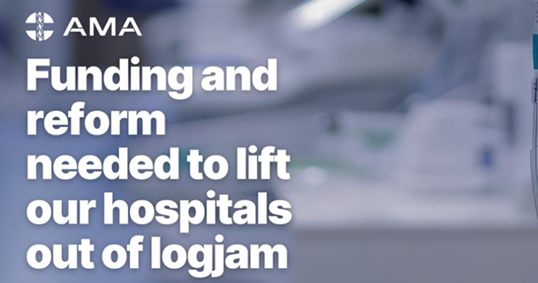
New hospital funding welcome, but more funding and reform will be needed
by Dr Danielle McMullen
Federal AMA President
On Friday 30 January, National Cabinet agreed to a new hospital funding deal. While it does not deliver everything that doctors, patients and health advocates have called for, it marks an important shift. Funding alone will not clear the Hospital Logjam overnight, but two changes are significant: an increased Commonwealth contribution and the removal of the funding cap. Together, these changes represent an additional $25 billion from the Commonwealth — a meaningful step forward.
This moment did not arrive by chance. The Clear the Hospital Logjam campaign began in 2021 after the AMA’s Cycles of Crisis analysis exposed how capped growth, activity based funding and inefficient price settings were driving sustained pressure across public hospitals. The consequences were visible to communities everywhere: overcrowded emergency departments, ramped ambulances and growing surgical backlogs.
Since then, the AMA has consistently argued for a stronger Commonwealth–state funding partnership — one that supports performance, expands capacity, reduces avoidable admissions and addresses exit block. That case has been made through five years of sustained advocacy: through engagement with governments and departments, through election cycles at both state and federal levels, and through sustained advocacy in the public domain.
Importantly, this work has been grounded in the lived experience of patients and clinicians. The AMA’s Hospital Logjam Finder used independent AIHW data to show how more than 350 hospitals were performing, giving communities clear, local evidence of system strain. Australians shared their experiences, contacted their representatives and kept hospital funding on the political agenda. Over time, that public focus created momentum for change.
There is still substantial work ahead. The detail of the agreement matters, as does how funding is translated into hospital level reform, real capacity growth and improved performance. States will also need to lift their share if outcomes are to improve. While an agreement is better than no agreement, AMA modelling indicates this deal alone will not be sufficient to reverse the decline in hospital performance. States will also need to lift their share if outcomes are to improve. While an agreement is better than no agreement, AMA modelling indicates this deal alone will not be sufficient to reverse the decline in hospital performance. (duplicated paragraph in screenshot)
Additional funding will help, but it is unlikely to reach the 45 per cent Commonwealth share of total hospital costs by 2030 that the AMA has long argued is necessary. Costs are rising, the population is growing and ageing, and care is becoming more complex. These pressures have not eased — and neither has the need for reform.
The AMA will continue to engage constructively and hold governments to account to ensure this funding delivers measurable improvements for patients, doctors and communities — and helps Australia clear the hospital logjam.
Ambulance Ramping Report Card 2025
Ambulance services are essential for the delivery of safe, high-quality, and timely care, providing critical emergency response services to stabilise and transfer patients to the hospital emergency department.
The Ambulance Ramping Report Card is the first to include five-year longitudinal comparisons across each state and territory.
Read report

The AMA is shining a light on Australia's hospital performance
Australia's hospitals are under more pressure than ever. The AMA Public Hospital Report Card provides an easy-to-understand snapshot of public hospital performance in your state or territory.
Read reportAMA funding solution to our hospital crisis
The AMA's detailed costed plan for our public hospitals focussed on four key areas — improving performance, expanding capacity, addressing avoidable admissions and increasing funding. Read about how we’ve done it.
Read report






